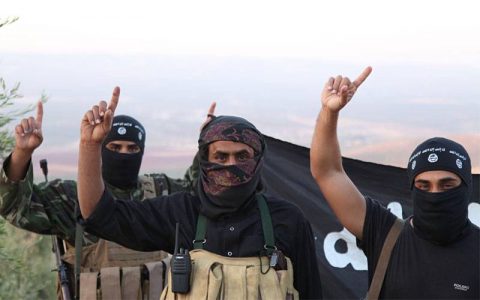
Islamic State is “knocked out” but is still showing signs of life in Syria
The Turkish military operation against Syrian Kurdish groups last month has not led to the resurgence of Islamic State (ISIS) that many feared, but experts say the extremist jihadist group could still revive itself if Turkey resumes its offensive.
Operation Peace Spring swept into northern Syrian territories controlled by the Kurdish-led Syrian Democratic Forces (SDF), which Turkey views as a terrorist group due to its links to insurgents on its own soil. But the SDF led the ground war of the U.S.-backed coalition against ISIS in Syria, and the Turkish operation severely impacted its ability to guard the thousands of jihadist prisoners captured during the campaign.
Fabrice Balanche, an associate professor at the University of Lyon and a fellow at the Hoover Institute, said there was an increase in attacks by ISIS cells “because overall security became diminished as the SDF moved forces to counter Turkey’s proxies”.
Balanche said the SDF was viewed as an accepted political authority in northern Syria in contrast to the Turkish-backed Syrian National Army, which is accused of abusing Kurdish civilians under its rule.
But Pentagon report in August said ISIS had already successfully exploited Arab grievances against the SDF in Deir al-Zor and other parts of Syria under SDF rule.
Nevertheless, the mass ISIS resurgence feared by many analysts prior to Turkey’s operation has not come about, and instead ISIS cells have stuck to guerrilla tactics rather than more direct confrontation.
Syria expert Steven Heydemann, a former director of the United States Institute of Peace’s Syria programme, said the level of violence attributable to ISIS had changed little since Peace Spring began.
“We continue to see what appears to be similar levels of violence linked to ISIS, pre- and post-Turkish invasion. Occasional IEDs of one sort or another are the most common now as they have been for a while.” he said, referring to improvised explosive devices.
Amarnath Amarasingam, a fellow at the George Washington University’s Center for Cyber and Homeland Security, echoes the assessment, acknowledging that more ISIS attacks followed the Turkish offensive, but not on a level that showed any serious rise.
“We just don’t know whether that automatically means the (ISIS) networks themselves are increasing or decreasing,” said Amarasingam, referring to the initial uptick in attacks claimed by ISIS. “I don’t think we have enough data to say anything concrete about that.”
A number of factors could have prevented an ISIS resurgence. Syrian government troops and their Russian backers quickly moved into areas vacated by U.S. forces. The SDF has held on to some of its territory, which the United States now appears to be helping defend after rowing back on its decision to fully withdraw. Turkey has also been proactive in the struggle against ISIS.
In the opening phase of Peace Spring, Turkish President Recep Tayyip Erdoğan insisted that Turkey would combat ISIS. Turkey has since announced the arrests of hundreds of ISIS operatives, including the wife of Abu Bakr al-Baghdadi, the ISIS leader who was killed in a U.S raid on Oct 26.
While it may have had some success, there remain doubts about whether Turkey will prioritise suppressing ISIS.
Balanche said Turkey’s past interactions with the group were not always positive. Turkey generally had allowed fighters travelling to Syria to transit its territory freely as it was at the expense of its enemies. This activity was only curtailed when Ankara closed its borders after requests from the international coalition and attacks by ISIS within Turkey.
There may even be the possibility that Turkey could allow some ISIS cells to survive in a state that is more manageable, according to Balanche. “Weak ISIS cells are useful against the SDF/YPG and not dangerous for Turkish security as was the case when ISIS was in control of its caliphate.”
But Erdoğan has hinted the present lull in fighting may not last. “We will not stop until the last terrorist leaves that region,” Erdoğan told reporters last week, referring to the SDF.
If operations were to suddenly continue in northern Syria, it could lead to an unstable situation that would allow ISIS to regroup. Amarasingam suggested that their relative silence since the initial end of Peace Spring has been purposeful. “It’s been quiet, but it doesn’t mean they are not exploiting the weaknesses of the situation in some way. They are quite strategic in terms of when they attack, how they attack and what targets they choose.”
In the meantime, Amarasingam said, ISIS would wait for the right opportunities before exploiting the weaknesses that accompany anything as disruptive as the renewed operation Erdoğan hinted at.
“The lack of attacks doesn’t necessarily mean that everything has gone away or is safe. It just might mean these cells are being a bit more strategic about how they are exposing themselves.”
Source: Ahval News





